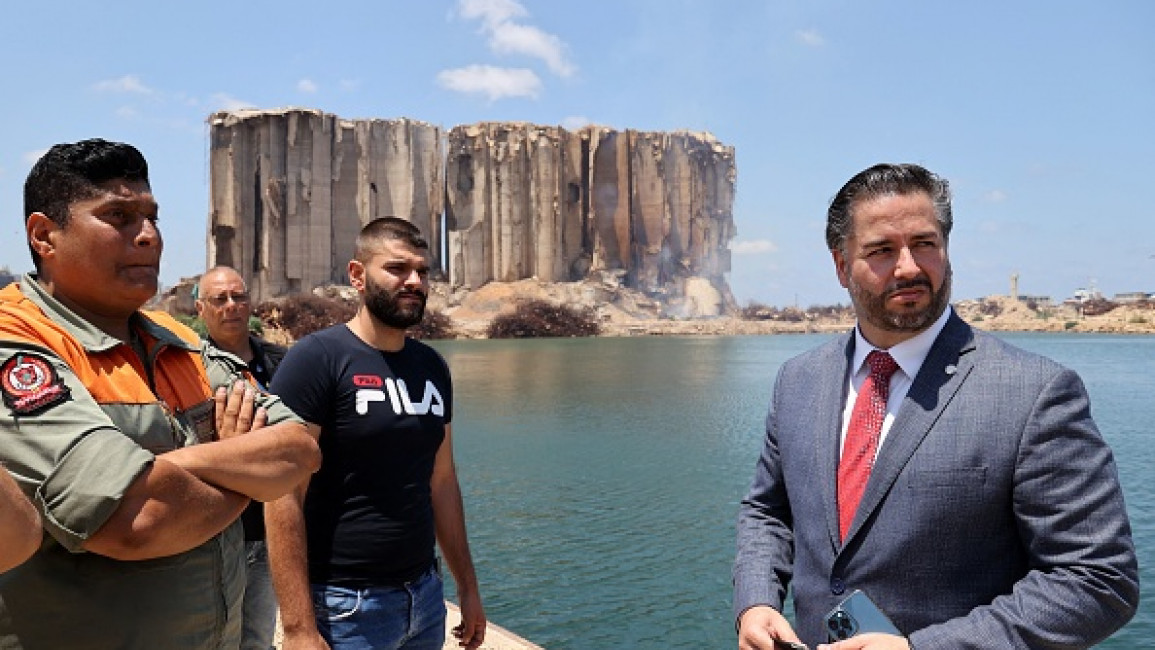Kuwait asks Lebanese minister to withdraw comments over help to rebuild wheat silos
Comments made by a Lebanese minister about Kuwait’s assistance to help rebuild Lebanon’s wheat silos have angered the Gulf state, which slammed the remarks as an interference in the country’s internal affairs.
Kuwait on Saturday asked Lebanese caretaker Economy Minister Amin Salam to withdraw the statement he made to local media on the eve of the 4 August 2020 explosion at the Port of Beirut.
Salam said he had sent a letter three weeks ago to the Emir of Kuwait Nawaf Al-Ahmad Al-Sabah, asking him to help rebuild the wheat silos at the Beirut port, as well as at the port of Tripoli.
The minister said he requested help from the Kuwaiti Fund for Arab Economic Development, saying: "The money is there, and the decision to build wheat silos in Beirut and Tripoli can be made with a stroke of a pen."
The latter phrase is what seemingly sparked criticism from Kuwait.
"The grain silos in the Port of Beirut were previously financed by the State of Kuwait in 1969 through a loan provided by the Kuwait Fund for Arab Economic Development," the Kuwaiti foreign ministry said in a statement.
Kuwaiti Foreign Minister Salem Abdullah Al-Jaber Al-Sabah expressed his country’s "condemnation and astonishment at this statement, which contradicts the most basic political norms."
Rights groups say that Lebanon's own investigation into the Beirut port explosion has been blocked at every turn by the state and the ruling political class. Three years since the devastating incident, are there any routes to justice?#BeirutBlast https://t.co/3xL69Pb88N
— The New Arab (@The_NewArab) August 4, 2023
The Lebanese minister's statement "reflect a limited understanding of the nature of decision-making in Kuwait, which is based on constitutional and institutional foundations, including the grants and humanitarian loans it provides," said Al-Sabah.
He urged Salam to withdraw his comments "for the sake of good bilateral relations between the two countries."
"Kuwait has a rich historical record of supporting people and friendly countries, but the State of Kuwait categorically rejects any interference in its decisions and internal affairs," Kuwait’s top diplomat added.
Salam later clarified what he meant, saying he was misunderstood.
"What we meant by 'a stroke of a pen,' which is a phrase used in the colloquial Lebanese dialect, is that the issue can be implemented quickly," he said, adding that the use of this phrase was not intended to bypass constitutional and legal principles and mechanisms in Kuwait nor by Lebanon.
The caretaker minister hoped the Kuwaiti parliament would accept this clarification.
"I had a clear conscience in my request, because I appeal to a brotherly country that has always stood by Lebanon, considering the risks to food security," Salam added.
The matter has gained traction on social media, where some Kuwaiti Twitter users expressed both their frustration and even mocked the Lebanese government for "stealing Lebanon then begging for money."
'Witness to crime of the century'
Reports in August 2020 - days after the massive explosion killed over 200 people and wounded thousands – said Kuwait could help rebuild the wheat silos at the Beirut port.
The silos served as Lebanon’s only strategic grain reserve.
Last year, most of the northern section collapsed on three separate occasions after a fire burnt in them for weeks due to fermenting grains. Activists have called for the preservation of the silos as a monument to the tragedy and a "witness" to what has been labelled "the crime of a century."
Today, only part of the southern section remains standing.
Lebanese people commemorated the third anniversary of the blast on Thursday, amid a local probe which has been blocked by the country’s governing elite and no one yet held accountable.
Some of the victims' families have called for an international investigation, which some political parties have refused.
A series of controversies
Salam’s comments were not the first to anger officials from a Gulf state. Other ministers have in the past commented on Saudi Arabia’s role in the Yemen conflict, and most recently made comments on free speech in the kingdom.
In 2021, then-foreign minister Charbel Wehbe resigned after controversial – and what many considered racist – remarks he made about a Saudi political analyst, calling him a "Bedouin."
Although Lebanon has historically shared good ties with the Gulf, relations have been strained over the last few years, particularly with Saudi Arabia.
Riyadh’s tense ties with Beirut are related to what it says is Hezbollah’s large influence in Lebanese political affairs and the country’s foreign policy. It’s also because of Hezbollah’s alleged backing of Houthi militants in Yemen – where Saudi Arabia has led a military coalition since 2015 - and drug smuggling, particularly the amphetamine pill captagon.
The powerful Shia militant group Hezbollah and its main backer Iran have denied accusations that they control Lebanon.
Despite a China-brokered Saudi-Iranian détente earlier this year, Hezbollah is still classified a terrorist organisation by the six-member Gulf Cooperation Council.



